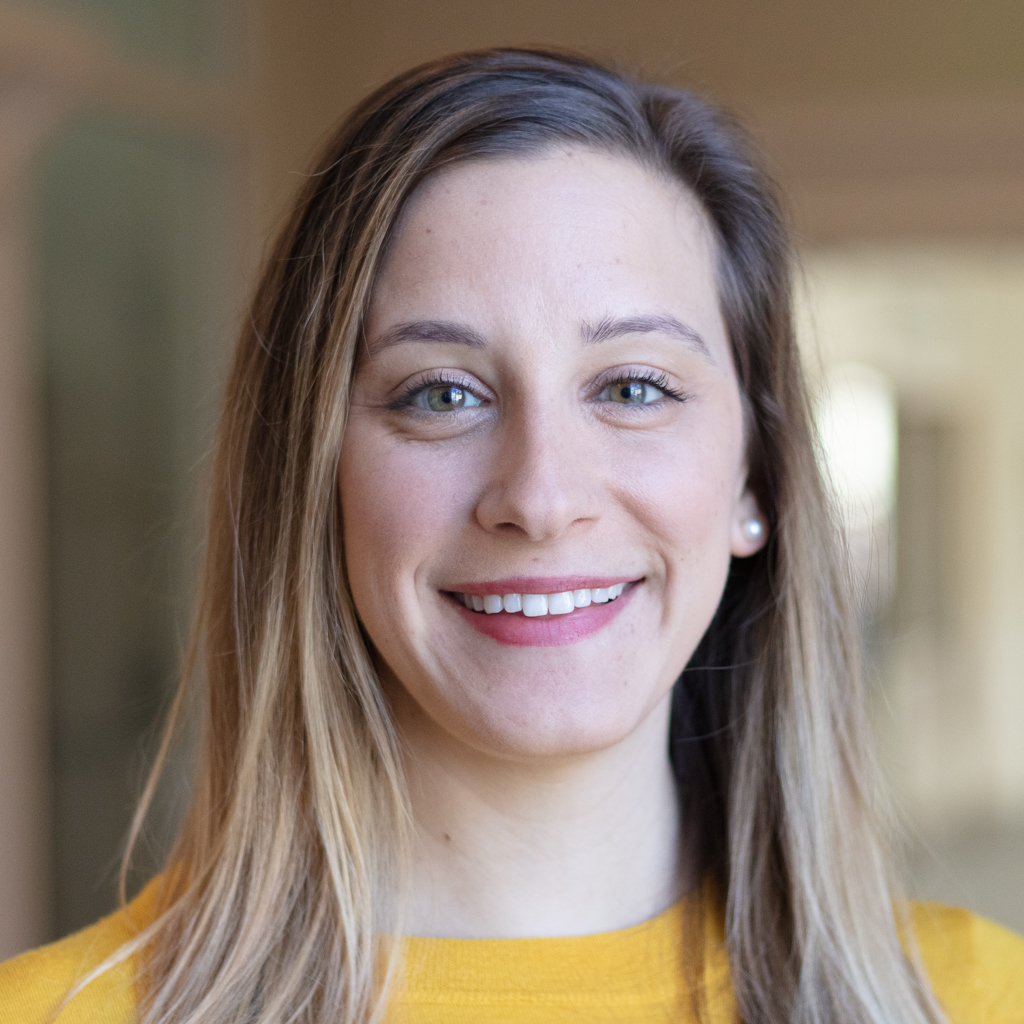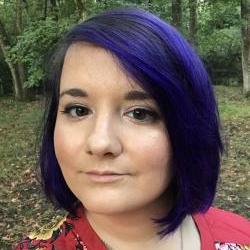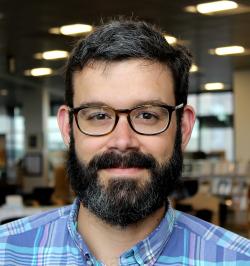- About Archives
- About SAA
- Careers
- Education
- Publications
- Advocacy
- Membership
Sarah Woods, El Pomar Foundation
Biography:
Sarah Woods received her MLS with a specialization in Archives & Records Management from Indiana University, Bloomington in 2018. She currently works as Curator of Historic Properties & Archives at El Pomar Foundation in Colorado Springs, CO. Before coming to El Pomar, Sarah worked at Wylie House Museum and interned in the archives at NASA Langley Research Center and United States Olympic & Paralympic Committee. Upon relocating to Colorado Springs, Sarah helped form a professional organization that brings together colleagues from archives, libraries and museums across the Pikes Peak region. Sarah serves on the board of Central City Opera.
Candidate question: What acquisitions and appraisal opportunities do you currently see in the profession, and what can the section do to help archivists manage these changes?
The COVID-19 pandemic has forced the world to adopt new working conditions amid a rapidly changing culture. Archivists working remotely must continue to manage physical and born-digital acquisitions and appraisals. Social distancing will require archivists to build and maintain donor relations in new ways. Many donors will be grappling with widespread joblessness, anxiety, illness, and death. Archivists must document the pandemic experience among diverse groups and populations, continuing to highlight the importance of equity, inclusion and issues of bias in archives. During this unprecedented time, the SAA Acquisitions & Appraisals Steering Committee has the opportunity to underline the current battle cry, We are all in this together! By curating timely blog posts, cultivating diverse case studies, and sharing newly-developed resources for managing acquisitions and appraisals, the steering committee can provide support and guidance to archives professionals collectively looking for a way through this historic moment.
Hilary Gatlin, Duke University

Biography:
Hillary Gatlin joined Duke University as Records Manager in 2018. In her role, Hillary works with offices and departments across campus identifying, appraising, and transferring records to the University Archives for permanent preservation. She previously worked at George Mason University as a Records Management Specialist and at Michigan State University as Records Manager. Hillary received her BA from the University of Mary Washington and her MLIS from the University of Pittsburgh. Hillary is currently finishing her second term on the SAA Records Management Section steering committee and is an active participant in local ARMA chapters, currently serving as the secretary of the Triangle ARMA chapter in North Carolina.
Candidate question: What acquisitions and appraisal opportunities do you currently see in the profession, and what can the section do to help archivists manage these changes?
I believe the biggest challenge and opportunity in regards to acquisitions and appraisal is the exponential growth of electronic records. As records continue to move to born-digital formats, we are provided with an excellent opportunity for collecting records at a broader scope, but the size of electronic collections raises important questions of value. Archivists will need to make hard decisions in regards to electronic collections, as we do not have the resources to capture everything or make it available for use. Archives staff will need strong appraisal procedures and a clearly developed apparatus to evaluate large volumes of electronic records in a cost-effective and useful way.
I believe the acquisitions and appraisal section can provide a community forum for appraisal discussions and decisions. Although appraisal decisions will always involve individual and organizational considerations of resources and collecting policies, providing additional guidance or potential examples of existing policies would be helpful to the Archives community. Questions of appraisal in both paper and electronic formats are also closely intertwined with concerns involving privacy, accessibility, and records management. The steering committee can work closely with other SAA sections in these areas to develop a stronger archives community for making and documenting appraisal decisions, including sharing documentation, guidance, and other resources.
Jordan Jancosek, Brown University

Biography:
Jordan Jancosek received her dual-degree MLS/MA in Archival Concentration and History from Simmons College in 2015. That same year she accepted a Project Archivist position at Brown University's John Hay Library concluding the end of a CLIR processing grant for The Hall-Hoag Collection of Dissenting Propaganda. This position then lended itself to a three-year position conducting a Survey Project at the John Hay Library of its collections in their entirety: identifying cataloging discrepancies, processing projects, and taking the lead on writing the John Hay Reappraisal, Deaccessioning, and Abandoned Loan Policy. Through this position Jordan became more ingrained with the processes and workflows within the John Hay and the Brown University Library at-large, as well as what was required to manage the materials within the John Hay for the future. Based off her work and progress with the Survey Project, she was most recently promoted to the permanent position of Archivist, Accessioning and Collections Management at Brown University. This new position oversees all aspects of material accessioning/deaccessioning, rare book and manuscript collection management, and on-site/off-site stack space and material storage.
Candidate question: What acquisitions and appraisal opportunities do you currently see in the profession, and what can the section do to help archivists manage these changes?
I will start with the biggest challenge I see facing our future, as it can also lend itself to a great opportunity for archival and special collection repositories. It will be more important than ever for repositories to prioritize sustainable collecting as we move into the future. It is important to continually re-evaluate what we are collecting and why; foster strong working relationships with other geographically relevant repositories and what their current and future collecting aims are/will be; and continually think about how we can provide the best stewardship not only to our patrons, but to our materials.
Unnecessarily large collections and/or collections that duplicate materials in other repositories hamper our ability to adequately store, process, catalog, and conserve materials which ultimately reduces our ability to provide researchers with the best service and resources. I took the initiative to create the Brown University Library's Reappraisal and Deaccessioning Policy because I was able to see first-hand what can happen when a repository reaches spatial and staff capacity to oversee materials. I believe the Acquisitions and Appraisal Section can provide the foundation and subsequent tools to help repositories navigate their collecting processes from start to finish, as well as help outline the importance of constant collection and collecting re-evaluation. Through conversation and sharing personal experiences, this section can lead the way in helping the SAA community thoughtfully meld old practices with new ideas.
Angela Naumov, Helen Fowler Library at Denver Botanic Gardens
Biography:
Angela Naumov is the Archivist at the Helen Fowler Library at Denver Botanic Gardens. There, she has been assisting with the move into a brand new library space, working to make the archival collections accessible. While collections were in storage and unavailable, she has been creating new policies and procedures to match the new space. As well as the Society of American Archivists, Angela is a member of the Society of Rocky Mountain Archivists and the Council on Botanical and Horticultural Libraries. Angela received her MLIS from the University of Denver and her Bachelor of Environmental Design from the University of Colorado at Boulder.
Candidate question: What acquisitions and appraisal opportunities do you currently see in the profession, and what can the section do to help archivists manage these changes?
One of the biggest acquisitions and appraisal challenges I see in the profession right now is creating and maintaining relationships with the community to develop an understanding of the importance of archives. The world we live in is much less static than it once was, and people find themselves moving around more and more. As a result, people go through many more iterations of “weeding” of their own items. Items that could be donated to archives are being rid of much more readily, particularly because people are unaware what value these items may hold. Especially for archives of special libraries and public libraries, acquisitions are heavily reliant on the public and their physical manifestations of significant experiences that make history.
Making personal connections, as brief as they may be, to plant seeds of interest and understanding about the role of archives is vital to encouraging such cooperation. While this is of course a challenge, it is also a great opportunity to diversify our connections with the communities around our archives and therefore, diversify our holdings. It is likely there will be far more to appraise and sift through, but what archivist isn’t thrilled at the prospect of yet more backlogs to process? Maybe this will encourage archivists to do more of the processing at the time of acquisition and appraisal, educating the public just a bit with each interaction. At the very least, it would be cause for us to discuss options with other archivists.
Meaghan O'Riordan, Emory University

Biography:
Meaghan O’Riordan has served as the Accessioning Archivist for the Stuart A. Rose Manuscript, Archives & Rare Book Library at Emory University since 2016. Previously she was a Library Associate at North Carolina State University. She holds a masters in library science from UNC-Chapel Hill. She currently serves on the Best Practices Sub-Committee of the Acquisitions & Appraisal Section of SAA. She is engaged in a grant-funded research project about the value of archival accessioning with Rosemary K. J. Davis, the Accessioning Archivist for Beinecke Rare Book & Manuscript Library at Yale University.
Candidate question: What acquisitions and appraisal opportunities do you currently see in the profession, and what can the section do to help archivists manage these changes?
One of the most significant challenges in the profession for acquisitions and appraisal is the exponential growth special collections repositories have experienced in the late 20th and early 21st centuries in terms of both size and scale of manuscript collections. As repositories seized the opportunity to collect more and more, many of them have not compensated with additional resources to support those acquisitions. There have been promises of additional, new, and reconfigured staff positions with some fulfilled, some never manifesting, and none enough to tackle the rate of growth of collections. Considering the solution of reducing or stopping collecting presents its own challenges.
First, some institutions are mandated to collect, regardless of capacity, because they are depositories for certain kinds of records. Second, many institutions participating in exponential growth are also institutions with the financial resources to engage in the market of buying archival collections. There are budgets to spend out by the end of the fiscal year and endowed funds that can only be used for specific kinds of collection material. Third, we are eager to preserve history. I do not suggest that collecting at this rapid rate is a result of malicious intentions. I think this is a parallel to the expansion of the world and those who care about it. There is so much more to collect, and we know about so much more to collect; it is hard to resist taking anything and everything that seems vital to understanding the world and its history.
The Acquisitions & Appraisal Section can help archivists manage this change by offering support to archivists feeling overwhelmed by the significant growth of collections they are struggling to steward. The Section can help members understand the complicated nuances of this issue, such as the market of purchasing archival material, and advocate for methods that will provide access to new collection material efficiently, even with this rate of growth, such as implementing accessioning as processing programs. The Section can also help members advocate for resources to support the rate of growth, such as additional staff.
This challenge will be - has already been - complicated by the COVID-19 crisis as budgetary restrictions and hiring freezes limit our response to collection growth but not necessarily the rate of collecting. Even for institutions that will reduce collecting, hiring freezes and a redistribution of resources to serve the public better at a higher level of process will limit projects aimed at taking advantage of this situation in order to reduce the backlog. The Section can help archivists understand how to balance these competing needs. The Section provides a community to a group of workers often under-resourced and undervalued, performing largely invisible labor, and this is an incredibly important time for that community to exist.
Aaron Ramirez, Pueblo City-County Library District

Biography:
Aaron Ramirez is the Librarian Archivist for the Pueblo City-County Library District (PCCLD) Special Collections & Museum Services department in Pueblo, Colorado. Prior to coming onboard at PCCLD in 2018, Aaron worked as the Archives Assistant at the University of Texas at Tyler from 2014-2018. Aaron serves on the Society of Rocky Mountain Archivists as the Preservation Member-at-Large. As Librarian Archivist at PCCLD, Aaron oversees the organization, description, reference, and preservation of archival materials, and acquisition and accessioning of donations. Aaron earned a MA in History from The University of Texas at Tyler, and a MSLIS from the University of Wisconsin - Milwaukee. When not working, Aaron enjoys watching films, going on adventures with his family, and snuggling with his Norwegian Forest cat, Augustine.
Candidate question: What acquisitions and appraisal opportunities do you currently see in the profession, and what can the section do to help archivists manage these changes?
The biggest factor to consider with appraisal and acquisitions today is the COVID-19 pandemic. With many organizations putting acquisitions on hold, we are left to find new ways of developing and maintaining relationships with donors, while navigating the limitations of safely handling new materials. These extraordinary times call for us to review our workflows and policies, and reimagine how to go about our work in the "new normal." I see the A&A section as a place where professionals can collaborate on best practices and methods going forward. The section should be the go-to for professional development opportunities and resources related to A&A.